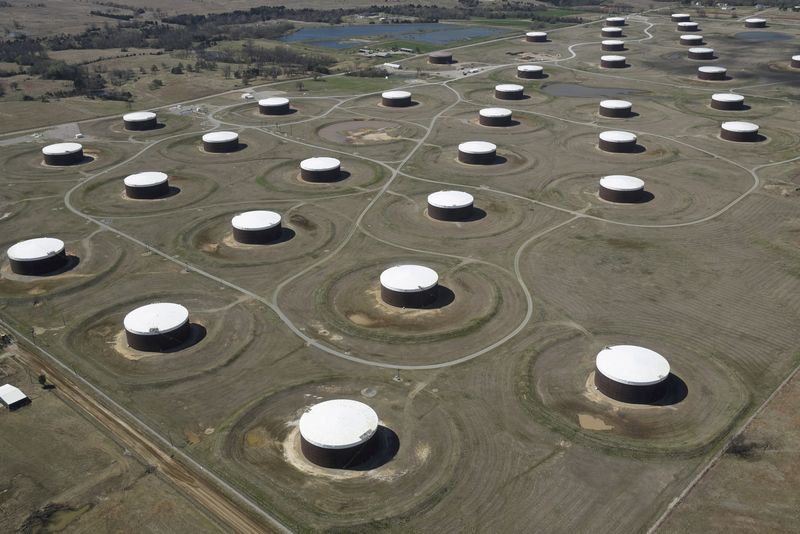By Susan Heavey and Alex Lawler
WASHINGTON/LONDON (Reuters) -The United States and its allies are weighing a coordinated release of oil reserves amid soaring prices and tightening supplies after Russia invaded Ukraine, an OPEC+ source and a senior industry source told Reuters.
Oil prices have hit their highest since 2014 following the invasion and after Western allies have imposed sanctions on Russia, blocking some Russian banks from a global payments system, which is already disrupting oil exports. Some buyers are already shunning Russian barrels, now trading at a heavy discount to world benchmarks.
Russia, one of the world's top oil producers, exports around 4-5 million barrels per day (bpd) of crude and another 2-3 million bpd of refined products. China, the European Union, South Korea, India and Japan are its main buyers.
The International Energy Agency (IEA), the Paris-based body which represents mostly industrialized nations, will hold an extraordinary ministerial meeting on Tuesday, the agency's head Fatih Birol said.
The meeting, to be chaired by U.S. Energy Secretary Jennifer Granholm, will concern "the impact of Russia's invasion of Ukraine on oil supply and how IEA members can play a role in stabilizing energy markets," Birol said in a Twitter (NYSE:TWTR) post.
Western sanctions on banks had carve-outs for Russian energy to avoid burdening consumers, but the move to cut off global payments has caused some parties to forgo facilitating transactions on Russian commodities.
Top buyers of Russian oil have struggled to secure guarantees at Western banks or find ships to take crude from Russia.
BP (NYSE:BP) has canceled fuel oil loadings from Russia's Taman port, sources said, as the energy company, the biggest foreign investor in Russia, abandons its stake in Russian oil giant Rosneft. Meanwhile, Britain ordered its ports on Monday to block any vessels that are Russian-flagged or connected to Russia.
U.S. President Joe Biden, eager to dampen high oil prices ahead of congressional elections in autumn, has said he wants to "limit the pain" Americans are feeling at the gas pump.
But he has warned sanctions could cause prices could rise. White House spokesperson Jen Psaki said sanctions on Russia's energy exports were not off the table, but could also have "extreme consequences for the world energy markets, particularly ours and Europe's."
RELEASE IMPACT
Last week a U.S. government source said talks with the IEA on releasing reserves were in the "early stages."
The senior industry source said the amount of any stock release had yet to be decided.
"The U.S. crude will be sweet and the volume is still under discussion," the source said. "Europe will mainly release products."
As it crafts the plan, the Biden administration is eager for OPEC+, a group of major oil producers including Saudi Arabia and Russia, to stick to its agreement to gradually boost output as the world emerges from the pandemic.
That deal was on track ahead of an OPEC+ meeting on March 2 to decide whether to go ahead with its monthly increase of 400,000 bpd in April. Still, no consultations have taken place with Saudi Arabia regarding a release of oil reserves by the United States and its allies, a senior Gulf source with knowledge of the matter said.
A reserve release would likely lower prices for a time, but it is unclear for how long.
"It should have a significant psychological effect on oil market sentiment, because it would signal to the market that the main oil-consuming nations are determined to try to prevent a further spike in oil prices," wrote analysts at energy consultancy FG Energy.
Last November, Washington announced a release of 50 million barrels from the U.S. Strategic Petroleum Reserve, a move made in concert with oil consuming nations including China, India and Japan.
So far only the United States has released large volumes, with its SPR levels falling to just over 580 million barrels, the lowest since 2002.

Earlier, the Wall Street Journal said the nations were considering a release of 70 million barrels, while Bloomberg reported they were weighing a release of about 60 million barrels.
According to officials cited by the WSJ, members of the IEA could agree as early as Monday or Tuesday to tap strategic oil reserves. The IEA declined to comment aside from Birol's comment on Twitter.